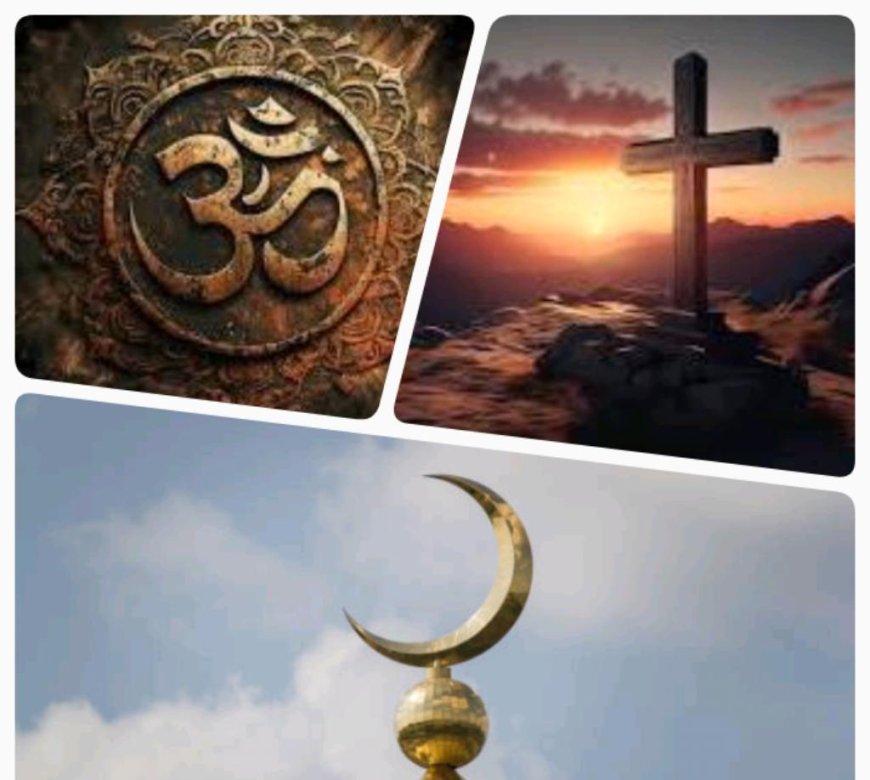Exploring the duality of diverse faiths
This article takes us through the similarities and differences found between the three most populous faiths.

Have you ever wondered about the uniting and the separating factors in different faiths? Have you ever considered the diverse belief systems of Islam, Christianity, African Traditional Religion, Buddhism, and others? Have you tried to identify the similarities and contrasting factors among these faiths? If you have, then you're like me; if not, let's embark on this journey together in this article. In this segment, we'll explore the similarities and differences between various faiths, with a focus on Islam, Christianity, and Hinduism as our case studies. You might wonder why these faiths are chosen; the reason is that, according to statistics, Christianity is the largest faith, practiced by approximately 2.4 billion people worldwide, followed by Islam with around 1.8 billion adherents, and Hinduism with about 1.1 billion followers. Now, let's begin!
Faith has several synonyms, including principles, religion, creed, and more. Similarly, there are various definitions of faiths from biblical, religious, and philosophical perspectives. According to Wikipedia, scholars define faiths as complex and diverse belief systems that encompass a wide range of beliefs and practices. It is a multifaceted spiritual practice found worldwide. The complexity and diversity of faiths foster a deeper appreciation for the rich tapestry of human spirituality, encouraging greater empathy, understanding, and peaceful coexistence. As mentioned earlier, there are diverse faiths with common backgrounds, similarities, and differences. Let's examine these similarities.
Similarities found in Christianity, Islam and Buddhism.
Belief in a Supreme or Divine Being: All three faiths share a strong belief in the existence of a divine or supreme being who is omniscient and created everything on earth. This supreme being has the power to create life and take life. People believe in this supreme being because it serves as something they can depend on and at the same time gives them a sense of security and hope. In Christianity, the supreme being is referred to by various names, such as Yahweh which reflects different aspects and attributes of the being as a provider, protector, savior, peace giver and so many more. In Islam, the supreme being is called Allah, known as the compassionate and merciful one. In Hinduism, the supreme being is called Brahman, also known as Nirguna, a being without form or shape that has always existed. However, the way they worship this supreme being differs, which will be explored later.
Use of Symbols: All faiths use diverse symbols to represent their beliefs. For instance, a person carrying a Bible and wearing a cross is instantly identified as a Christian. The significance of the cross can be attributed to the death of Jesus Christ, who sacrificed himself to atone for the sins of humanity, and this plays a vital role in strengthening the faith of Christians. Similarly, someone reciting their mantra with a tesbih in hand is recognized as a Muslim. The church and mosque serve as sacred symbols for Christians and Muslims, respectively. Likewise, the Hindus can be identified by their sacred garland beads.
Belief in the Afterlife: Another common thread among these faiths is the belief in life after death. This belief stems from the teachings people have received from their scriptures and religious leaders. Devotees see this belief as a reassurance of a better life after death and are deeply invested in it. Practitioners of these faiths believe that their deeds on earth determine their fate in the afterlife, motivating them to live a virtuous life. Christians call this afterlife Heaven (or Hell), Muslims refer to it as Aljannah (or Aljahannam), and Hindus call it Nirvana (or Naraka). Each faith has its unique concept of paradise and hell.
Rituals and Ceremonies: We are familiar with sacred ceremonies and festivals like Christmas (which marks the birth of Jesus Christ), Easter (signifies the death of Jesus Christ), Ramadan ( this is the holy month Quran was sent down to the people for guidance), Eid al-Fitr ( This is the end of Ramadan fasting), and many more. These rituals and ceremonies are vital to the practitioners of each faith. Hinduism has its unique practices like Yagna (sacrifice), puja (worship), and others. Each faith has its distinct rituals and ceremonies, which differentiate them from one another.
Difference between Christianity, Islam and Hinduism
Although all faiths believe in a divine or supreme being, their belief systems differ significantly. For instance, Hindus are polytheistic, worshiping multiple gods, whereas Islam and Christianity are monotheistic. Despite their shared monotheistic nature, Islam and Christianity have distinct beliefs; Christians believe that access to the Divine being is through Jesus Christ, while Muslims believe that the Divine being has no son, only a messenger, Muhammad (SAW). These differences reflect the unique perspectives of each faith and their paths to the supreme being. Regarding spirituality and growth, Christianity emphasizes a close relationship with Jesus, while Islam preaches submission to Allah alone. Hinduism, on the other hand, focuses on self-realization and purity to unite with Brahman. Additionally, these faiths have varying beliefs about the Afterlife. In Islam, one's deeds determine their fate in the Afterlife; in Christianity, salvation through Jesus Christ is compulsory for a favorable afterlife and the Hindus believe in reincarnation or rebirth and karma.
Another interesting difference is the history of how these faiths came into existence. According to Rice University, Hinduism is the oldest religion in the world, tracing back around 10,000 years to ancient Egyptian and Mesopotamian cultures. Christianity, on the other hand, is around 2,000 years old, with its roots in the Bible and Antioch, where practitioners were first called Christians. Islam is approximately 1,400 years old and its root can be traced also to Abraham (in the bible) first son Ishmael.
Furthermore, the attitudes of people in their diverse faiths vary. For instance, in Islam, Jesus is considered a prophet, but not the son of God. Muslims see Islam as the final and complete revelation. Christians, on the other hand, believe Christianity is the only path to salvation, and Jesus is the son of God and part of the Trinity. Hindus believe in respecting and honoring other faiths, recognizing that the truth of the supreme being's existence is universal, but with multiple paths to reach it.
In conclusion, these faiths share similar ideas and views about religion, but also have contrasting ideas, acknowledging and respecting these similarities and differences can lead to peaceful coexistence and good communal relationships among people of diverse faiths.
What's Your Reaction?










































































































